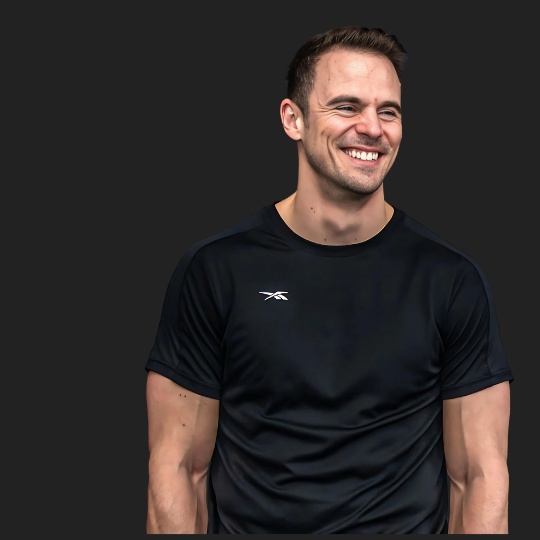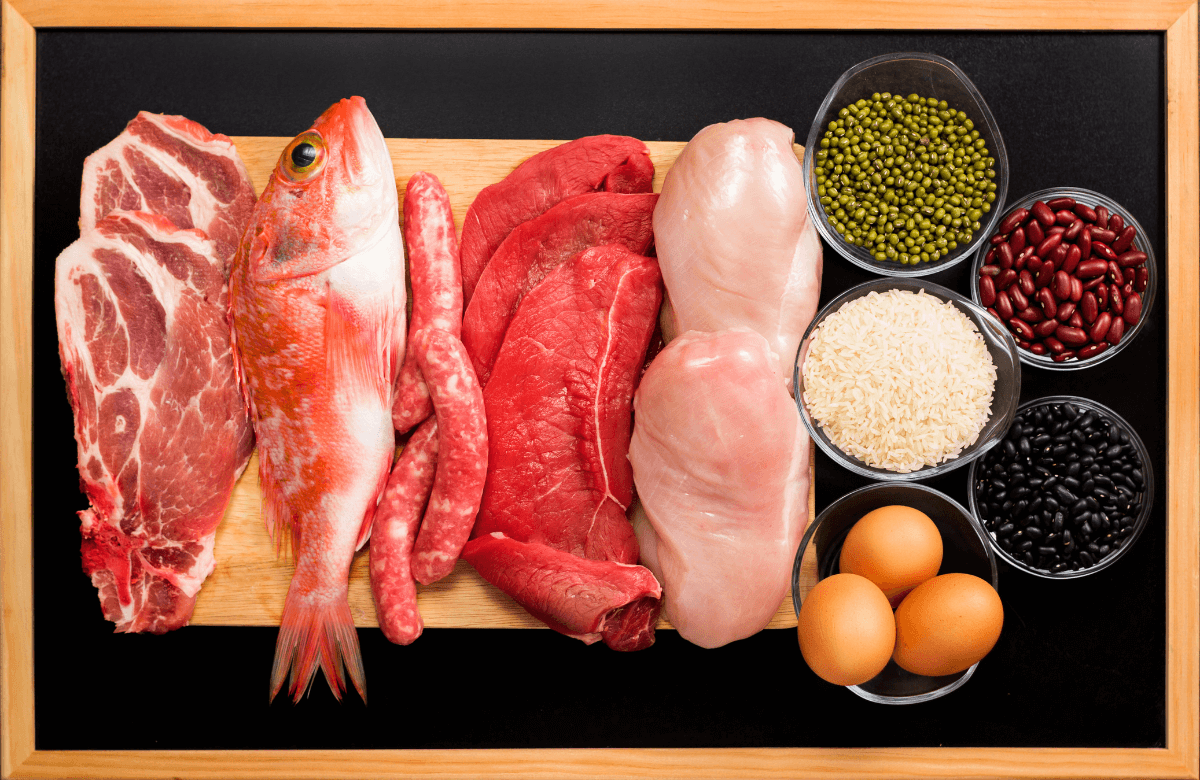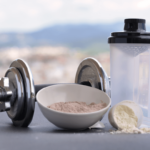In the realm of fitness and health, the conversation often revolves around weight loss, but for many people, the goal is to gain weight and build lean muscle mass. This journey toward a stronger, healthier body is underpinned by a vital element: protein.
Protein not only supports muscle repair and growth but also contributes to overall health and well-being. In this article, we’ll delve into the significance of protein in weight gain and muscle building and provide actionable tips to help you achieve your goals while prioritizing your health.
Jump to:
- Understanding Protein and its Role in Muscle Growth
- The Importance of Calories for Muscle Building
- High-Protein Foods for Muscle Growth
- Maximizing Your Protein Intake
- Balancing Nutrients and Calories
- Striving for Health and Fitness
- The Role of Protein Supplements
- Timing Your Protein Intake
- The Flavors of Protein
- Staying Hydrated
- FAQ
- Can I solely rely on protein shakes for muscle growth?
- How soon after a workout should I consume protein?
- Are there risks associated with high-protein diets?
- Can I gain muscle without increasing my protein intake?
- Can I drink too much water and overhydrate?
- Does the type of physical activity influence my hydration needs?
Understanding Protein and its Role in Muscle Growth
Protein, often hailed as the building block of life, assumes a central role in the intricate web of physiological processes that govern our bodies. It’s a macronutrient comprising amino acids, each functioning as a microscopic constructor responsible for various facets of bodily function. While its significance extends to multiple domains, one of the most prominent roles protein plays is in the realm of muscle growth and repair.
The Dynamic Dance of Amino Acids
Imagine amino acids as the alphabet in a genetic language that orchestrates the construction of our bodies. Just as letters form words and sentences, amino acids combine to form proteins. Our muscles, constructed of protein fibers, rely on amino acids as the raw materials for repair, regeneration, and growth.
Each amino acid contributes a unique note to this symphony of creation, with some promoting healing while others encourage muscle expansion. When you engage in physical activity, especially resistance training, your muscles undergo microscopic damage. This triggers a process where amino acids step in as the architects of repair, rebuilding fibers stronger than before.
Protein Synthesis: The Blueprint of Muscle Growth
Central to the saga of muscle growth is a phenomenon called protein synthesis. This intricate biological process involves the creation of new proteins, a vital component of muscle tissue. After a strenuous workout, the body responds to the demands placed on it by increasing protein synthesis to repair and strengthen muscles.
Adequate protein intake provides the amino acids necessary for this process, enabling your muscles to recover efficiently and foster lean muscle growth.
Protein’s Balancing Act: Muscle Breakdown vs. Muscle Building
It’s important to recognize that muscle growth isn’t solely about protein synthesis; it’s also influenced by the balance between muscle breakdown and muscle building. Intense physical activity, especially weightlifting or endurance exercises, can trigger a state of temporary muscle breakdown. This might sound counterintuitive, but it’s a critical part of the muscle-building process. When your muscles undergo this controlled damage, the body responds by increasing protein synthesis to repair and fortify them against future challenges. Protein’s role in this equation is paramount—it provides the amino acids needed to tip the scale in favor of muscle building over breakdown.
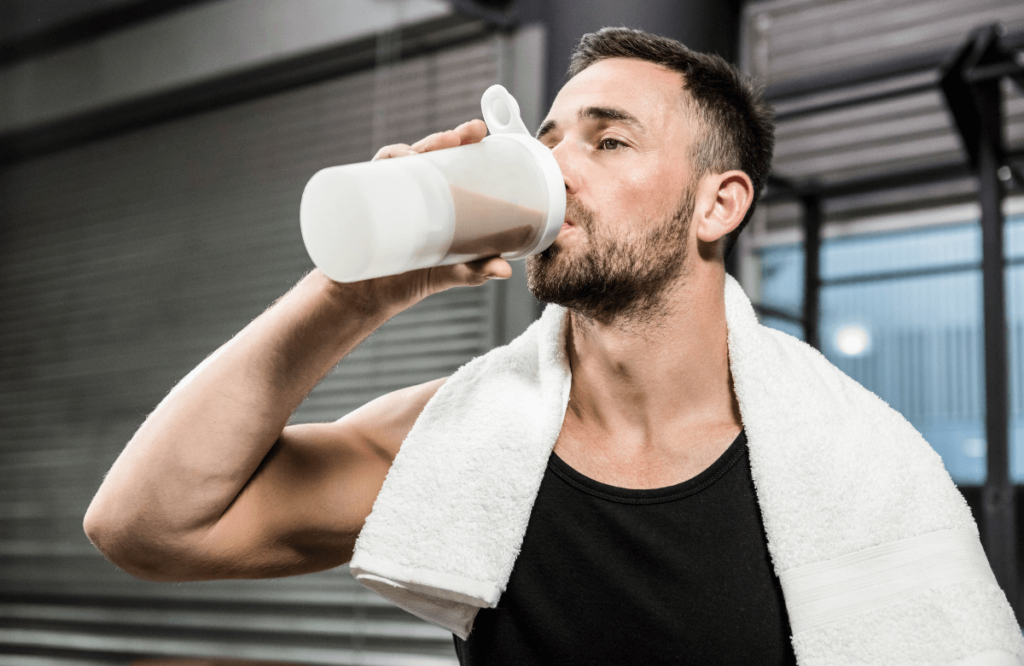
The Importance of Calories for Muscle Building
To build muscles effectively, your body requires an adequate supply of calories. These extra calories provide the energy necessary for workouts, muscle repair, and overall bodily functions. However, not all calories are created equal. Nutrient-dense foods, rich in vitamins and minerals, should be prioritized over empty-calorie options.
Carbohydrates as Fuel for Muscle Growth
Carbohydrates are a key source of energy for your body, making them an essential nutrient in your muscle-building journey. When you engage in intense workouts, your body utilizes carbohydrates for fuel, allowing you to power through your training sessions effectively.
The Role of Protein in Muscle Repair and Growth
When you subject your muscles to the stress of workouts, they undergo microscopic damage. Protein steps in as the building block for repairing and rebuilding these muscle fibers. Consuming an adequate amount of protein facilitates muscle repair and contributes to the growth of lean muscle mass.
High-Protein Foods for Muscle Growth
To support your muscle-building efforts, focus on incorporating these high-protein foods into your diet:
Lean Meats
Lean meats such as chicken, turkey, and lean cuts of beef are excellent sources of protein. They provide the amino acids needed for muscle repair and growth without excessive saturated fats.
Greek Yogurt
Greek yogurt is not only rich in protein but also contains probiotics that promote gut health. This makes it an excellent choice for both protein intake and overall well being.
Nut Butters
Peanut butter, almond butter, and other nut butters offer a flavorful way to increase your protein intake. They’re also a source of healthy fats and additional calories, which can aid in your muscle-building journey.
Whey Protein Powder
Whey protein shakes are convenient sources of protein that can be easily consumed post-workout. They provide a concentrated dose of grams of protein and amino acids to support muscle repair and growth. It is a great powder for weight gain.
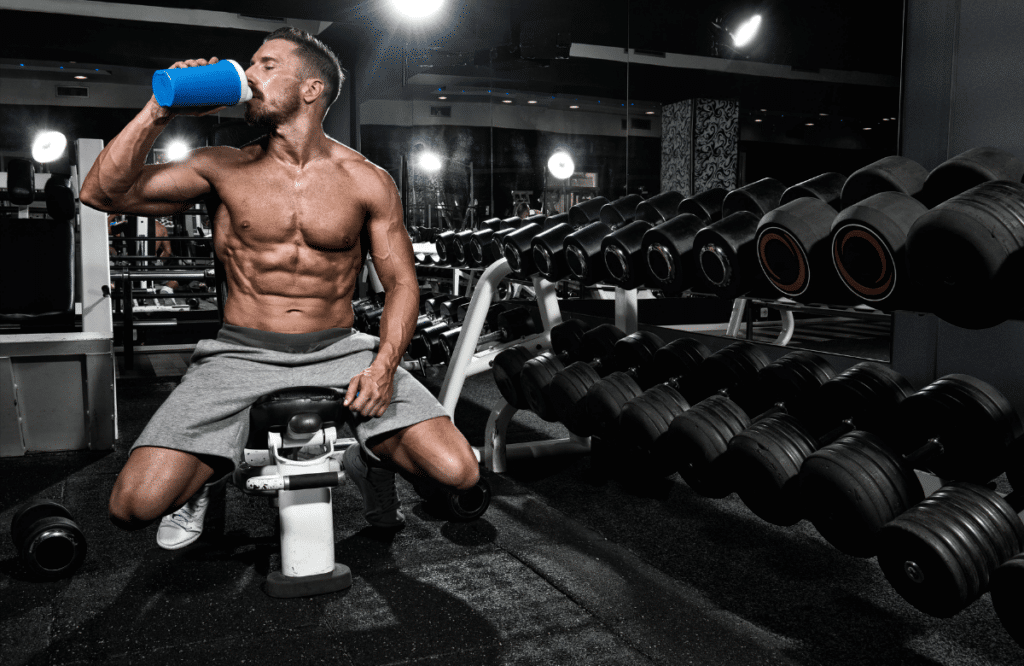
Maximizing Your Protein Intake
As the cornerstone of muscle growth and repair, protein plays an irreplaceable role in the pursuit of a stronger and healthier body. Whether you’re an aspiring athlete, a fitness enthusiast, or someone simply looking to enhance their physical wellness, understanding how to effectively maximize your protein intake is essential. In this section, we’ll delve into the strategies and insights that will empower you to harness the full potential of protein for achieving your fitness goals. From deciphering optimal protein quantities to exploring various sources and timing considerations, you’ll gain the knowledge needed to make protein a powerful ally in your journey to a more robust and vibrant self.
Calculating Your Protein Needs
A general guideline for active individuals is to consume around 1.2 to 2.0 grams of protein per kilogram of body weight. Adjust this range based on your fitness goals and activity level.
The Role of Protein Shakes
Protein shakes, especially those made with whey protein powder, can be effective in supplementing your protein intake. They’re easily digestible and can provide the necessary amino acids for muscle repair after a workout.
Balancing Nutrients and Calories
As you embark on a journey to achieve your health and fitness goals, the concept of balance becomes a guiding principle. Balancing nutrients and calories is the cornerstone of a successful approach that fuels your body for optimal performance and wellbeing. While the importance of calories is clear in providing the energy needed for daily activities and workouts, the significance of nutrients cannot be understated. In this section, we delve into the art of finding equilibrium between calories and nutrients, ensuring that your body receives the sustenance it needs to thrive on the path to your desired outcomes.
Prioritizing Nutrient-Dense Foods
While protein is essential, don’t overlook the importance of vitamins, minerals, and other nutrients. Consume a variety of nutrient-dense foods to support overall health and well-being.
Adding High-Calorie Foods Wisely
To achieve your calorie surplus, opt for high-calorie foods that are also nutrient-rich. Avocados, nuts, seeds, and healthy oils can be valuable additions to your balanced diet.
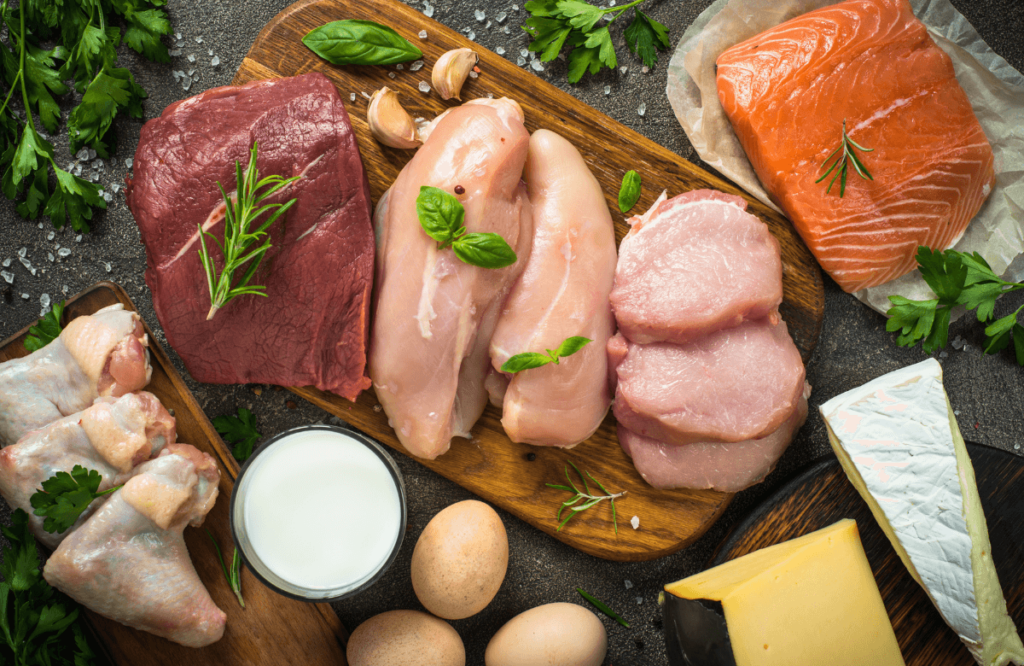
Striving for Health and Fitness
In a world increasingly focused on holistic wellness and physical vitality, the pursuit of health and fitness has become a universal endeavor. Whether you’re an avid athlete, a casual gym-goer, or someone taking their first steps towards an active lifestyle, the journey towards improved health and fitness is a transformative and empowering one. This path encompasses not only physical strength and endurance but also mental resilience and overall wellbeing.
By prioritizing balanced nutrition, regular exercise, and mindful self-care, individuals can embark on a gratifying expedition toward a life defined by vitality, strength, and a deep sense of accomplishment. In this section, we’ll explore the multifaceted aspects of health and fitness, offering insights, guidance, and inspiration to help you thrive on your personal journey towards a healthier and more active life.
Consistency in Workouts
Regular workouts that target different muscle groups contribute to balanced muscle development. Consult a fitness professional to design a workout plan aligned with your muscle-building goals.
Monitoring Progress
Keep track of your progress, both in terms of muscle gain and overall health. Pay attention to how your body responds to dietary changes and adjust your approach as needed. Building lean muscle mass through a balanced approach to protein intake, nutrient-rich foods, and well-structured workouts is rewarding. Remember, muscle growth takes time and dedication. Prioritize your health and listen to your body throughout the journey. Consult a healthcare professional or registered dietitian to tailor your nutrition and fitness plan to your individual needs and ensure that you’re progressing safely and effectively.
The Role of Protein Supplements
For individuals striving to meet their protein intake goals efficiently, protein supplements can be valuable allies. Protein shakes, especially those formulated for weight gain and muscle growth, often contain a blend of high-quality protein content and additional ingredients to support your fitness goals.
Mass Gainers: A Convenient Option
Mass gainers are specialized products designed to provide a substantial amount of calories, protein, and carbohydrates in one convenient shake. They’re particularly helpful for those who struggle to consume enough calories through regular meals alone.
Whey Protein Isolates and Concentrates
Whey protein, derived from milk, comes in various forms, including isolates and concentrates. These protein powders are easily absorbed by the body, making them a popular choice for post-workout nutrition.
Reading Labels and Choosing Wisely
When selecting protein supplements, it’s essential to read labels carefully. Look for products with minimal added sugars and a balance of protein and carbohydrates. Additionally, consider the ingredient list to ensure you’re choosing a product with quality ingredients.
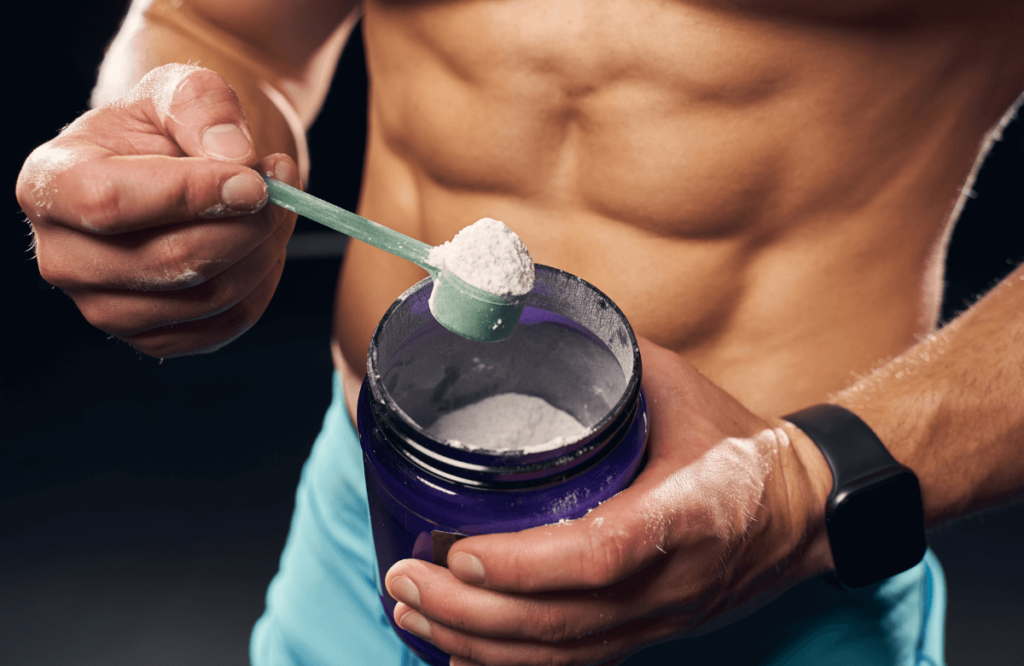
Timing Your Protein Intake
In the world of fitness and muscle-building, the timing of nutrient intake can significantly impact your progress. Protein, a fundamental building block for muscles, holds a special place in this regard. When and how you consume protein can influence muscle repair, growth, and overall performance. In this section, we delve into the importance of timing your protein intake strategically to harness its full potential in supporting your muscle-building goals. Whether you’re a dedicated athlete or someone aiming to enhance their fitness journey, understanding the significance of protein timing can take your results to the next level.
Post-Workout Nutrition
Consuming protein after a workout is crucial for muscle recovery and growth. Aim to consume a protein-rich meal or shake within the first hour after exercising to provide your muscles with the necessary building blocks.
Protein Throughout the Day
Distribute your protein intake evenly throughout your meals and snacks. This approach ensures a steady supply of amino acids to support muscle repair and growth throughout the day.
The Flavors of Protein
The term “protein” often conjures images of bland and monotonous meals. However, the world of protein-rich foods and supplements is far from flavorless. The misconception that a protein-focused diet is devoid of taste is a thing of the past. Today, we explore the exciting array of flavors that protein sources and products offer, showcasing how you can infuse your meals with both nutrition and deliciousness. From savory to sweet and everything in between, the flavors of protein are as diverse as your palate. Let’s delve into the creative and mouthwatering ways you can elevate your protein intake while indulging in a symphony of tastes.
Variety and Enjoyment
Protein-rich foods and supplements come in a wide range of flavors, allowing you to experiment and find options that you enjoy. This variety can make it easier to stick to your dietary plan and ensure that you’re meeting your protein goals consistently.
Incorporating Protein into Recipes
Get creative with your protein intake by incorporating it into your favorite recipes. From protein-packed pancakes to homemade protein bars, there are numerous ways to infuse protein into your meals without compromising on taste.
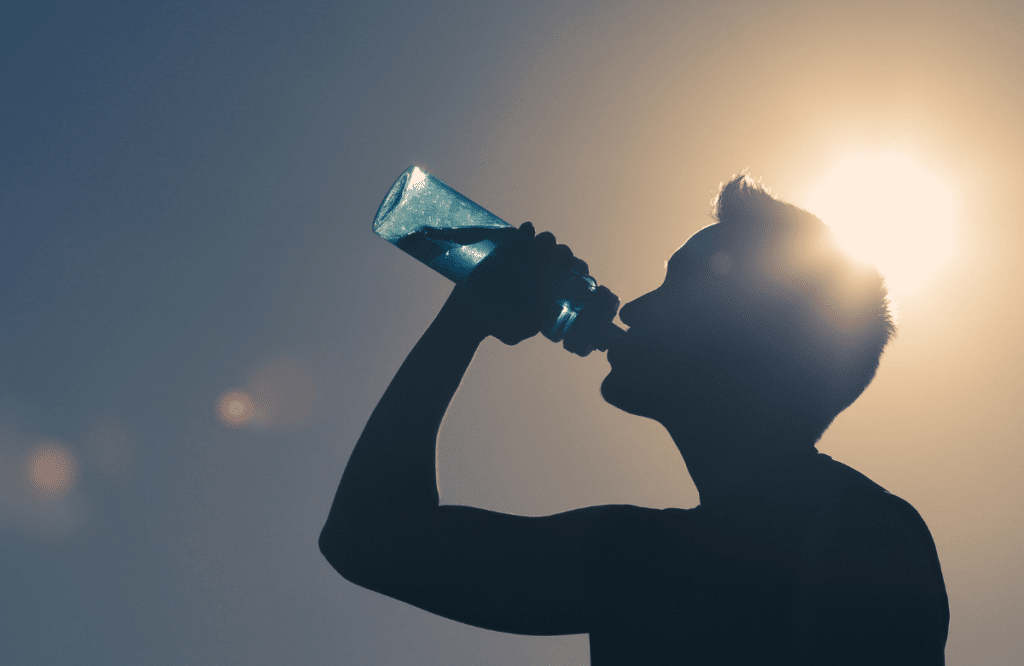
Staying Hydrated
Few practices are as fundamental and yet often overlooked as proper hydration. Water is the essence of life, and maintaining adequate hydration is crucial for sustaining our body’s intricate balance and optimizing its functions. From supporting digestion and circulation to promoting clear skin and boosting energy levels, staying hydrated plays a pivotal role in our overall well-being. In this segment, we delve into the significance of hydration, its direct impact on various aspects of health, and practical strategies to ensure that your body is nourished with the elixir it needs to thrive.
Hydration and Muscle Function
While protein is essential for muscle growth, hydration also plays a critical role. Proper hydration supports muscle function, endurance, and overall performance during workouts.
Water and Protein Intake
Increase your water intake, especially when consuming higher amounts of protein. Adequate hydration ensures that your body can effectively process and utilize the protein you’re consuming.
FAQ
Can I solely rely on protein shakes for muscle growth?
While protein shakes can be a convenient way to supplement your protein intake, it’s important to prioritize whole food sources for a well-rounded nutrient intake.
How soon after a workout should I consume protein?
The anabolic window, or the optimal time for protein intake after a workout, is typically within one to two hours. However, the overall quality of your daily protein intake is more important than the exact timing of post-workout protein consumption.
Are there risks associated with high-protein diets?
Excessive protein intake may put a strain on your kidneys and potentially lead to digestive issues. It’s essential to balance your protein intake with other nutrients and consult a healthcare professional if you have concerns.
Can I gain muscle without increasing my protein intake?
While protein is essential for muscle growth, it’s also important to consider your overall calorie intake and training regimen. Adequate protein supports muscle repair and growth, but achieving a calorie surplus and engaging in effective strength training are also key factors.
Can I drink too much water and overhydrate?
Yes, overhydration, known as water intoxication, is a rare but serious condition that can lead to an imbalance of electrolytes in the body. It’s important to listen to your body’s signals and aim for a balanced approach to hydration.
Does the type of physical activity influence my hydration needs?
Absolutely. The intensity and duration of your physical activity play a role in your hydration requirements. Sweating during workouts leads to fluid loss, and you need to replace those lost fluids accordingly. Tailor your hydration strategy to match your exercise routine and environmental conditions.

